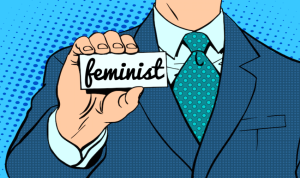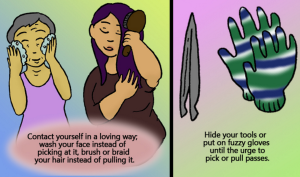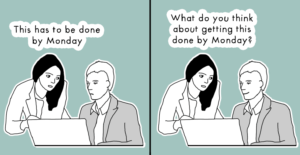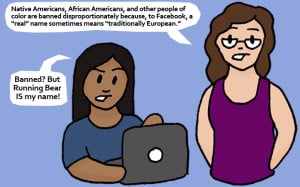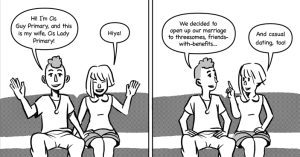This is a quick and dirty checklist for all of you feminists and allies out there living with male privilege and ready to move past feminism 101.
Maybe you’re a man who is generally aware of the unfair advantages you’re granted in this society by virtue of your gender. You already know about the economic glass ceiling, the obscenely high rates of sexual and physical assault against women and gender non-conforming people in this country, and the ways that gender socialization in patriarchal contexts are meant to prime men to take on positions of power.
Let’s say you know better than to use words like “hysterical” or “bitch,” and you sure as fuck know not to blame heated arguments on the fact that someone is on her/zir/their period.
If this is you, you’ve got a running start.
Male privilege can be understood as a set of unearned rights, advantages, and/or immunities that men enjoy by virtue of living in a patriarchal society. If you are a woman or gender non-conforming person, examples of how men benefit from patriarchy are often glaringly obvious.
But, if you’re someone with male privilege however, some of the more subtle examples might be harder to identify.
Sometimes misogynistic behaviors are super blatant and recognizable, and other times they take on more subtle hues that pop up unexpectedly in our daily interactions. Aside from perpetuating misogynistic behaviors, there are so many other ways of thinking and engaging that can be just as harmful.
I hope these insights will be useful as you continue on your journeys to become the best feminists you can be!
1. Manterruptors
In every workshop, conference, meeting, discussion group or classroom conversation, there is usually at least one guy who wins this title.
It’s so common in multi-gendered situations to witness men talking out of turn, interrupting other people while they’re talking, or completely disregarding the allotted time-limit a facilitator has set for individual questions or comments.
These men will often highjack the conversation and/or derail its original topic in order to match their own personal interests.
In these contexts its also common for men to go off on lengthy diatribes in order to show off how much they know about a subject.
Sometimes, in an attempt to be polite, a man will raise their hands over and over again to make comments despite the fact that their opinions have been heard way more than anybody else in the room already.
“Misogynistic?” you might ask, skeptically. Isn’t that kind of behavior just plain rude?
The answer is yes – regardless of who you are, these kinds of behaviors are just plain rude. But the larger question I would pose is: What possesses a person to act this way in the first place? Who is it that feels comfortable (or oblivious) of dominating space in this way?
My point? It is a misogynistic sense of entitlement that encourages men to think that what they have to say is more important or valuable than anybody else.
Check that shit: Move Up, Move Back.
2. Emotional Labor Dodgers
I was commiserating with a friend recently about how the relationships we have with men in our lives often feel one-sided when it comes to emotional support.
Because men are discouraged from sharing their feelings with one another – or from having feelings at all for that matter – their friendships with women and gender non-conforming folks tend to be sort of default safe-spaces for them to express and process their feelings without judgment.
Now, mind you, as long as I’ve given consent, fulfilling the role of confidant isn’t a problem on its own. I enjoy holding space for the people I care about to unpack the hard shit they might be going through.
But here’s the thing: Men will often pour their hearts out to their female or gender non-conforming friends in a therapy-esque fashion, but when the tables are turned, men are often not willing to reciprocate the same kinds of emotional labor.
I have had so many male friends who could talk endlessly to me about their lives, ask for advice or help trouble-shooting situations from various different angles, but as soon as the conversation wraps up, god forbid I start talking about my hard day at work! Their eyes glaze over with boredom, and I suddenly feel as though I’m talking to myself.
This can really leave a person feeling hurt, used and uncared for.
The unconscious expectation that men often have regarding this one-sided caretaker dynamic is explicitly rooted in misogyny. It implies that every woman or gender non-conforming person owes you some kind of free, maternalistic, emotional labor.
3. The Manspreader
Finally there is a term that communicates the ways that men are often unaware of their physical surroundings or how much space they feel entitled to take up.
While this term was coined specifically in relation to the subway car environment, I feel it can be applied to all sorts of scenarios: men who leave piles of their personal shit everywhere in shared living environments, men who leave unfinished projects spread out across designated work stations they might share with their co-workers, and so on.
In my opinion, the definition of a manspreader can be extended to any dude who – by virtue of the amount of physical space he is taking up with his physical body or personal items – makes it impossible for anyone else to utilize a space that they should also have equal claim to.
The implication and underlying message that gets communicated through manspreading is that you feel a sense of ownership and entitlement over the space.
Honestly, you may as well just pee on it to really drive the point home. (Just kidding!)
4. Gotye Manbabies and Accidental Manipulators
Gotye’s hit song, “Somebody,” portrays such a quintessential, gendered situation lots of people who date men find frustrating. Let’s just quickly recap the lyrics for context, shall we?
In the beginning of the song, our male protagonist tells us that he was in a relationship with a woman he was’t that excited about. He tells us that when the relationship ended, he felt relieved: “When we found that we could not make sense / You said that we would still be friends / But I’ll admit that I was glad that it was over.”
At another point in the song we hear a bit from the woman’s perspective: “Now and then, I think of all the times you screwed me over / Had me believing it was always something that I’d done / I don’t wanna live that way, reading into every word you say.”
When the chorus starts, we learn that even though he wasn’t invested in the relationship in the way she was (a recipe for hurt feelings, no doubt) he feels he should still get to have access to her in all the ways he did before the break up.
He doesn’t understand why she might want to take space from him or be out of contact for a while.
And instead of empathizing with her about how rough breakups can be on the person who was way more invested, he makes himself the victim:
“You didn’t have to cut me off / Make out like it never happened and that we were nothing / And I don’t even need your love / But you treat me like a stranger, and that feels so rough / No, you didn’t have to stoop so low / Have your friends collect your records and then change your number / I guess that I don’t need that though / Now you’re just somebody that I used to know.”
Ugh! So frustrating!
Aside from the lack of emotional unaccountability he’s displayed in the relationship, and despite the fact that he got what he wanted – for it to be over – he has the gaul to make her out to be the bad guy!
Here’s what I would say: I’m sorry your feelings are hurt, dude. But you know what? You took me for granted! I’m not your fucking mom or therapist, nor do I owe you any sort of access to my personal life!
In the same vein, if a woman or gender non-conforming person calls you out on some relationship dynamics that don’t feel good or if they implement a bit of space in order to heal from your actions, do not act wounded and shift the attention to your own need for reassurance.
Your hurt feelings are not always the priority.
Do not expect women or gender non-conforming people to coddle you through the uncomfortable feelings that come along with being called out.
Be self-reflective and accountable, respect the boundaries that are requested, and talk your hurt feelings out with a friend.
5. Unauthorized Advice Givers
OMG! These guys are everywhere!
The most immediate situations that come to mind are rooted in my experience as a solo femme musician. Despite the fact that I’ve been playing music and performing on my own for almost a decade, there is always the inevitable dude who comes up to me after my set to give me some advice about “the way I’m using my equipment” or “how I can improve my sound quality.”
When there’s a dude running the soundboard at a show, he will often ignore my request to turn up a microphone or put more sound in the monitors because he thinks “he knows what’s best.”
Before even hearing me play, he will endlessly talk at me about the brand of my loop pedal, tell me it’s outdated, and tell me about all the other countless types of pedals that might be “easier for me to use.”
Most women and gender non-conforming people I know have examples of similar scenarios outside of performance contexts, too.
For instance, try being a woman alone in a hardware store! Hardware stores are like breeding grounds for unauthorized advice givers!
Even when I go in knowing exactly what I want and where it’s located, some well-meaning male customer is likely to stop me because he thinks, “you look like you need help.”
Though things like this most often happen to people who aren’t male, presuming someone is ignorant about a given topic before you’ve even talked to them is alienating as fuck.
6. The Mansplainer
Number five is a perfect segue way into the problem of mansplaining.
Men are expected to wield a certain amount of confidence, authority, and power over every situation they are in. Failing to display these qualities is somehow considered a mark against his masculinity.
Now if I was living under this kind of societal pressure, what would I do if I felt confused or didn’t know the answer to something? I’d make shit up on the spot! At least sounding like I know what I’m talking about and then being wrong is better than looking uncertain and compromising my masculinity.
I’m just saying it makes sense why this cultural phenomenon occurs.
But here’s the thing: You don’t actually know everything, nor should you have to pretend like you do!
If you can just admit that you don’t know the answer to something, you may get a chance to learn something new. If you’re able to be quiet and listen for a change, there might be somebody else present who does have the answer.
Another common and unchecked form of mansplaining is the refusal to stop and ask for directions when you know you are fucking lost!
7. Manarchists, Mactivists, and Brogressives
In its most basic sense, these terms refer to men in activist communities who perpetuate misogynistic behaviors by virtue of failing to put their revolutionary theories into practice.
These are men who have made commitments to their communities to challenge systems of oppression like capitalism, heteropatriarchy, white-supremacy, sexism, and ableism.
Manarchist-like behaviors can be subtle – we don’t only witness them through corrupt leaders who pressure women in the movement to have sex with them.
Manarchists often tend to devalue or invisiblize movement work that’s traditionally been thought of as “women’s labor” (childcare, medic work, flyer making, distro, cooking, relationship building).
They might righteously prioritize strategies that are rooted in front-line, direct action tactics while discounting strategies that are rooted in tradition, spirituality or emotional-based practices.
They are always getting crushes or their queer female and gender non-conforming friends even when they have disinterest in ever dating cis-men.
They are only attracted to “Anarcho-Punk Barbie” or “Alterna-Grrrl Barbie”– thin, able-bodied white women in the movement who fit mainstream beauty standards.
They are known to exclude or dismiss single mothers as “faux activists” – it never occurs to them to offer to help with childcare so that a single mother can go to the rally/ meeting/ demonstration in their place.
8. Racist Sexualizers
These are men who perpetuate racialized tropes through the ways they sexualize women and gender non-conforming folks.
Some examples: men who refer to their Latina lovers as “spicy,” men who fetishize Black women because they are supposedly “bosses in the bedroom,” men who compare Native women to “spiritual awakenings,” or men who are under the assumption that all Asian women are perpetual service bottoms.
You don’t have to actually say these things aloud in order for them to influence your dating life.
Another common phenomenon that occurs under this banner happens when men tend to have women of color in their lives take on the roles of casual lover, booty-call, non-primary or “sidepiece,” while considering the white women they date as more“serious relationship material.”
9. Cis-Sexists
Negating someone’s gender identity is extricably linked to misogyny.
You do not get to decide what qualifies someone as a “man” or a “woman.”
When you fail to see transwomen as “real” women, you are asserting patriarchal control over what is and isn’t considered “womanly.”
You know what? I have chin hair, sit with my legs wide open, and curse like a goddamn sailor – things that are most certainly not considered “womanly.” Are you gonna tell me I’m not a woman?
Anyone who says they’re a woman is a woman. You are not the authority on womanhood. Case closed.
Further, insisting that there are only two genders is misogynistic in and of itself – the gender binary is a key weapon in patriarchy’s arsenal. The assertion that every person should be able to fit into one of two distinct genders results in a lot of people feeling alienated, unseen, and unsafe.
10. Fetishizers of (Non-Consensual) Pain
The last time I had strep, it felt like someone had taken a cheese grater to my throat. It was so painful! Within a couple days of having the virus, my voice got raspy and hoarse until eventually I wasn’t able to talk at all.
Before I had completely lost my voice, I can’t tell you how many people told me my voice sounded “sexy.”
There is a way that we are all taught to fetishize women’s pain.
If this is in a BDSM context, that’s one thing – but when someone is in pain non-consensually, don’t fucking fetishize that shit.
This might seem trite, but I’m telling you: It’s something men do all the time without even thinking about it.
This also goes for telling a woman she looks hot after having lost a ton of weight. Aside from being fatphobic, you also don’t know how or why that weight loss happened! Maybe she has a parasite that has had her throwing up every meal for the past six months.
Questions to Ask Yourself on Your Way to Allyship
As an act of solidarity here is a list of questions you can ask yourselves and each other when navigating that precarious ledge called allyship:
When venting to a close female or gender non-conforming friend, ask yourself, “Am I willing to reciprocate the same emotional labor that’s being offered to me right now?”
When in multi-gender company ask yourself, “Am I talking out of turn?” “Am I dominating the conversation?” “Am I feeling a need to be the know-it-all at the table?” “Do I actually know what I’m talking about or am I bullshitting so as not to compromise my masculinity?”
When in need of emotional support ask yourself, “Who are the men in my life I might be able to seek support from?”
After a breakup with a female or gender non-conforming partner, ask yourself, “Am I taking up a ton of space with my reaction? Am I relying on her/zir/them to caretake me through it?
When someone confronts you about displaying misogynistic behaviors, ask yourself, “Am I actually listening to what they have to say?” “Even though I’m feeling defensive, am I still being self reflective?” “Am I derailing the conversation and making it about my hurt feelings?”
Be humble and ask yourself, “Do I make a concerted effort to learn from my female and gender non-conforming friends about what sexism/ misogyny feel like first hand?
Always check in with yourself: “Have I been asked for assistance with a task someone near me is working on, or am I offering unasked for advice?”
Listen, guys. We see you.
Dismantling patriarchy is hard work, but you’re well on your way to becoming the feminists we need you to be!
[do_widget id=’text-101′]
Annah Anti-Palindrome is a Contributing Writer for Everyday Feminism and a Bay Area-based writer, musician, and queer/femme antagonist who hails from the working-class craters at the base of the Sierra Foothills. For more info on her work, see annahantipalindrome.com. To contact her, you can message her via her Facebook fan page!
Search our 3000+ articles!
Read our articles about:
Our online racial justice training
Used by hundreds of universities, non-profits, and businesses.
Click to learn more


